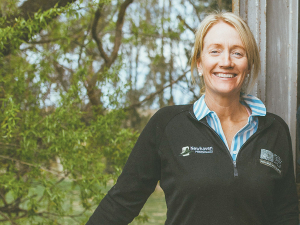Green no more?
OPINION: Your old mate has long dismissed the Greens as wooden bicycle enthusiasts with their heads in the clouds, but it looks like the ‘new Greens’ may actually be hard-nosed pragmatists when it comes to following voters.
 Farmer Jane Smith says the Government is asking for a fight on emissions targets and a fight they will get.
Farmer Jane Smith says the Government is asking for a fight on emissions targets and a fight they will get.
Prepare for more pine trees. That's the message from North Otago farmer Jane Smith following the new methane emission targets recently announced by the Government.
Smith, a founding member of the Methane Science Accord, says farmers are aghast at the "environmentally ignorant and economically inept" greenhouse gas emissions targets.
"Even worse than previous targets from the Green Party playbook, the Nats have now shown their anaemically weak understanding of science and have instead taken the impotent option of simply demanding higher generic targets," Smith says.
"We thought we had a coalition who understood the economy, who could see through rampant extremism in climate change positioning and would acknowledge the fact that Kiwi farmers are the best in the world, producing more food with lower emissions.
"We are the only sector in the world that actually utilises a GHG as part of our food production through photosynthesis process, and the only sector with an offset. Pasture-raised livestock are net sequesters of greenhouse gases but this is ignored by our own sector as this doesn't suit the current ideology."
Last month, Climate Change Minister Simon Watts announced New Zealand's second international climate target under the Paris Agreement.
He unveiled that New Zealand will reduce emissions by 51 to 55% compared to 2005 levels, by 2035.
"We have worked hard to set a target that is both ambitious and achievable, reinforcing our commitment to the Paris Agreement and global climate action," Watts says.
"Meeting this target will mean we are doing our fair share towards reducing the impact of climate change, while enabling New Zealand to be stronger and thrive in the face of a changing climate."
However, Smith says these targets are not only unnecessary and misguided, "they now fast-track the destruction of the integrity of our world-class red meat protein production as we loom towards feed additives and expensive interference with natural methane processes through a myriad of pointless vaccines, boluses and misguided genetics".
"The real shame is the waste of taxpayer money and science resources that will be diverted even further towards chasing methane fairies instead of genuine R & D.
"The Government is asking for a fight on this and a fight they will get. We will need indivdual farmers mobilised in order to do this, as our own sector leaders have simply appeased and agreed - all in the name of gaining accolades, funding and avoiding embarassment around the $1 billion that has been squandered on methane 'reduction' to date."
Smith says Watts needs a cold bath of reality.
"At the very same time that his own government demands increased production and growth, he has just cut the wings off the golden goose that would have paid for hospitalxs and healthcare that we already cannot afford.
"The sad reality is that all New Zealanders will pay for these misguided targets through even higher energy and food costs and continued slower economic growth.
"Prepare for more pine trees."
The Meat Industry Association of New Zealand (MIA) today announced that Chief Executive Officer Sirma Karapeeva has resigned from the role.
The winners of the 2026 Hawke’s Bay/Wairarapa Dairy Industry Awards were announced at the annual awards dinner held at Copthorne Solway Park in Masterton on Thursday evening.
Environment Southland is welcoming this week’s decision by the Environmental Protection Authority (EPA) to approve the release of Blaptea elguetai, a leaf‑feeding beetle that will help control the highly invasive Chilean flame creeper.
This March, the potato industry is proudly celebrating International Women’s Day on 8 March alongside the International Year of the Woman Farmer, recognising the vital role women play across every part of the sector — from paddocks and packhouses to research, leadership, and innovation.
Fruit trader Seeka posted a record profit and returns to shareholders in 2025.
Recent weather events in the Bay of Plenty, Gisborne/Tairawhiti, and Canterbury have been declared a medium-scale adverse event.

OPINION: A mate of yours truly reckons rural Manawatu families are the latest to suffer under what he calls the…
OPINION: If old Winston Peters thinks building trade relations with new nations, such as India, isn't a necessary investment in…